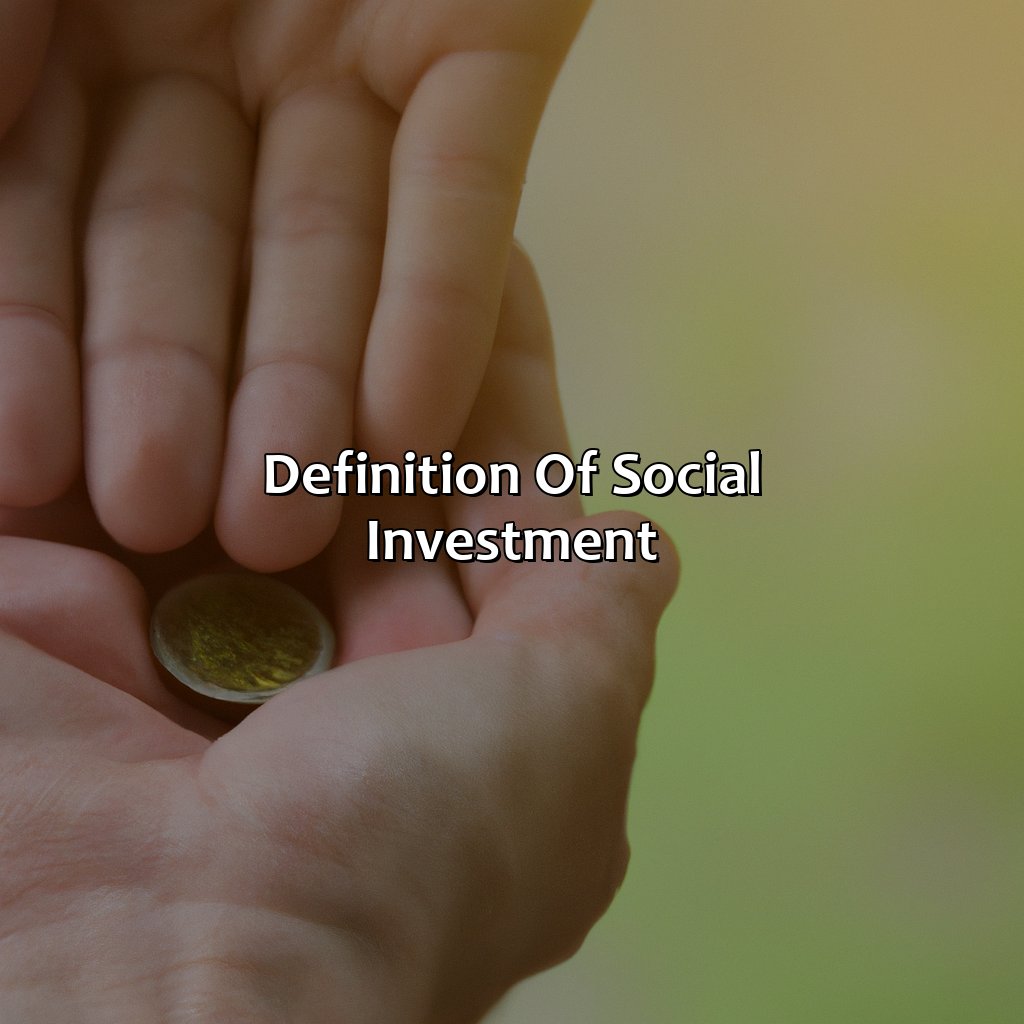What Is Social Investment?
Key Takeaway:
- Social investment refers to investments made with the intention of social impact alongside financial returns. It is a way for investors to contribute to positive social change while generating profits.
- There are two types of social investments: financial and non-financial. A financial social investment involves investing in a cause or organization that aims to have positive social impact and generate financial returns for the investor. A non-financial social investment involves volunteering or donating time, skills, or expertise to a social cause or organization.
- The benefits of social investment include creating social impact, generating financial returns, and fostering a sense of purpose and fulfillment for investors. Social investment can also lead to increased brand reputation and customer loyalty for businesses.
Are you feeling overwhelmed when it comes to understanding social investment? Read on to learn the basics of this key tool for social impact! You’ll understand how it works, and how it can unlock new sources of finance for social change.
Definition of Social Investment
Social Investment refers to the practice of investing resources, such as time or money, into organizations or initiatives that aim to generate social and environmental impact, in addition to financial returns. This form of investment is focused on creating positive change that aligns with the investor’s values, and can be made through a range of financial instruments, such as grants, loans, or equity investments.
It is a way for investors to support social and environmental causes that are important to them, while also receiving a financial return on their investment. By investing in social enterprises, nonprofit organizations, or community development initiatives, investors can contribute to the creation of a more equitable and sustainable society.
One unique aspect of social investment is the emphasis on partnership and collaboration between investors and the organizations they support. Through ongoing dialogue and engagement, investors can provide strategic guidance to help organizations achieve their goals, in addition to providing financial support.
A notable example of successful social investment is the Global Alliance for Improved Nutrition (GAIN), which was founded in 2002 as a public-private partnership to tackle malnutrition worldwide. Through collaboration with governments, businesses, and civil society organizations, GAIN has been able to leverage funding from a range of sources to deliver impact and create lasting change.
Overall, social investment offers a unique way for investors to make a positive difference in the world, while also achieving financial returns. By aligning their investments with their values, investors can help build a more equitable and sustainable future for all.

Image credits: retiregenz.com by Yuval Woodhock
Types of Social Investment
Social investment refers to the allocation of funds with the aim of generating social and environmental impact, alongside financial returns. The different beneficiaries of social investment include charities, non-profit organizations, and social enterprises.
The following are some types of social investment:
- Social Impact Bonds: These are a form of financing where the investor funds a social program and receives returns based on the successful outcome of the program.
- Community-Driven Development: In this type of investment, the community members themselves develop and implement the projects that aim to benefit them socially and economically.
- Microfinance: This refers to the provision of small loans and other financial services to impoverished individuals, helping them create sustainable livelihoods.
- Impact Investing: This involves investing in businesses that prioritize social and environmental impact alongside financial returns.
- Philanthropic investments: Philanthropic organizations invest in charities and non-profit organizations to support social causes, with minimal or no interest expected in return.
It is essential to analyze and research before investing in any social investment activity. Social investment provides an opportunity to invest capital while promoting a good cause, thus amplifying the investor’s impact beyond personal gain.
Pro-Tip: While selecting a social investment, consider the potential social and environmental effects alongside the financial outcomes.

Image credits: retiregenz.com by Joel Woodhock
Benefits of Social Investment
Social Investment Benefits:
Social investment brings with it a host of positive outcomes, including greater societal impact, more effective use of resources, and increased sustainability. Here are six key benefits of social investment:
- Enhanced Social Outcomes: By investing in socially responsible enterprises, you can bolster social outcomes like education, healthcare, and environmental protection.
- Financial Returns: Socially responsible investments have the potential to generate competitive financial returns while supporting ethical practices.
- Increased Efficiency: Effective utilization of resources by socially responsible companies promotes sustainability and smarter use of resources.
- Stronger Communities: Funding socially responsible ventures strengthens community bonds and promotes social cohesion.
- Mitigating Risks: Investing in responsible businesses can help to manage risk by avoiding investments in industries with inadequate social safeguards or weak governance protocols.
- Positive Brand Image: By investing in companies that promote environmental and social responsibility, one can enhance their company’s positive brand image.
In addition to these benefits, social investment can support the United Nations’ sustainable development goals and promote a more equitable and sustainable global economy.
Pro Tip: Before making any social investment, it is critical to conduct thorough research and due diligence to ensure that the company aligns with your ethical and financial goals.

Image credits: retiregenz.com by Adam Woodhock
Examples of Social Investment
In the world of finance, there are several forms of investment, and social investment is one such form. Social investment is the act of an investor investing in social enterprises or projects that are aimed at achieving social and environmental objectives along with financial gains.
The following are some examples of social investment:
- Investing in social impact bonds that aim to deliver specific social outcomes, such as reducing reoffending rates and lowering the demand for emergency hospital admissions.
- Providing funds for community development finance institutions, which provide affordable credit for community development, social enterprise, and micro-businesses.
- Investing in social enterprise funds that distribute capital to social entrepreneurs who aim to achieve social or environmental aims.
- Investing in renewable energy projects, with the aim of promoting green energy and reducing carbon emissions.
- Investing in charities and non-profit organizations that provide vital public services to communities such as providing support for people with disabilities or mental illness.
Social investment plays a significant role in building a sustainable future and making a positive impact on society. By investing in social causes, investors are not only earning financial returns but also contributing towards a better future.
It’s a fact that “According to the Global Impact Investing Network (GIIN), as of 2020, the global impact investing market size was estimated at $715.4 billion” (source: marketwatch.com). This highlights the growing trend of social investment and its impact on the finance industry.

Image credits: retiregenz.com by James Arnold
Challenges in Social Investment
Social Impact Investing: Overcoming Hurdles
Social investment is seen as an effective way to support social and environmental goals using conventional commercial transactions. However, few investors have committed to it due to the challenging nature of this investment. Success requires navigating several challenges, such as measuring social impact, assessing financial performance, and gathering relevant data from organizations operating within the field.
Moreover, one of the common obstacles is a long-term perspective and non-market returns in social investments. Investors require a dependable outlook and results from their investments, but social outcomes may need more extended periods to materialize, which often makes investors hesitant. Social investment is a nascent field. Still, it holds enormous potential for creating a positive societal impact by financing organizations that tackle various social and environmental problems.
Therefore, investors must consider short- and long-term progress metrics for their social investments, as most social issues have complex, multifaceted solutions that need time to develop. It is also fundamental to develop a good pipeline of social investment deals by providing investors with a wide selection of organizations that match a range of social objectives.

Image credits: retiregenz.com by James Woodhock
Some Facts About Social Investment:
Social investment aims to generate both financial returns and social impact. (Source: OECD)
Social investments can take various forms, including loans, equity, and guarantees. (Source: EVPA)
Social investments are often targeted towards nonprofits and social enterprises working to address societal challenges. (Source: GIIN)
Social impact bonds are a popular type of social investment that ties financial returns to the achievement of social outcomes. (Source: Rockefeller Foundation)
The demand for social investment is growing globally, with major investors including foundations and pension funds allocating capital towards social impact. (Source: Morgan Stanley)
FAQs about What Is Social Investment?
What is social investment?
Social investment is an approach used to support organizations that create social or environmental impact. It involves the use of capital to generate social as well as financial returns.
What are the types of social investment?
There are different types of social investments such as direct investments, social impact bonds, and social venture capital.
How does social investment work?
Social investment works by channeling money to businesses or organizations that seek to carry out social projects and initiatives. The aim is to address social and environmental issues while also providing a return on investment to investors.
Who benefits from social investment?
The beneficiaries of social investment are the communities affected by social or environmental challenges, as well as the investors who receive financial returns on their investment.
What are the benefits of social investment?
The benefits of social investment include the creation of social and environmental impact, the provision of financial returns to investors, and the promotion of sustainable development.
What is the difference between social investment and traditional investment?
Social investment differs from traditional investment in that it places equal importance on social impact and financial returns. Traditional investment typically prioritizes financial returns over social impact.
 Checkout this IRS Loophole
Checkout this IRS Loophole 
